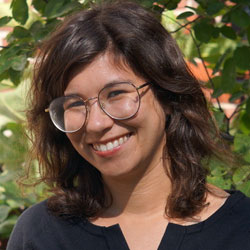So I had two lists of names for a girl, so
what. The president’s allowed to
have two speeches, in case the hostage
comes home in a bag. The geese
in the metropark don’t want
for bread crumbs, despite the signs
proclaiming the land provides them all
they need. I was a hard child, by which
I mean I was callous from the start.
Even now, were I to find myself after
a grand disease or blast, among the pasty
scattering of survivors, there isn’t one
human tradition I would choose to carry
forward. Not marking feast days, not
assembling roadside shrines, not marrying
up, not researching the colloquialism
STATEN ISLAND DIVORCE, not
representing paste pearls as the real
things, not recounting how the advent
of photography altered painting,
soured us on the acrylic portrait, thrust us
toward the abstract, sent us seeking
to capture in oil that which film would
never be wasted on: umbrella stands,
unlovely grates, assorted drains, body casts.
I typically hate discussing the past
and treasure the option, rarer and rarer,
to turn from it, as when K’s twins
were born and one of them
nearly died — I don’t remember which,
that’s how much they got better.
Notes on the Poem
We hope you're sharing our delight as we make our way through the poetry collections on the 2018 Griffin Poetry Prize shortlist, a Poem of the Week at a time. This week, we're savouring the many pleasures of Natalie Shapero's "Hard Child", the eponymous poem of her shortlisted work. The judges' citation for Hard Child the poetry collection describes "Hard Child" the poem perfectly:“The poems in Natalie Shapero’s Hard Child come as close as lyric poems can to perfection. We feel the effect of them before noticing their machinery. Yet every poetic instinct Shapero possesses, every decision of line, image, stanza, diction, and tone, results in poems that are limber, athletic, powerful, and balanced. And behind her technical choices lie an emerging ethics: “I don’t want any more of what I have. / I don’t want another spider plant. I don’t //want another lover.” Her poems take us to the purest evolutionary point of the lyric form through their single-speaker stance, the movement of a mind over subjects, the emotional weight carried on the backs of images, the unpredictable associations, the satisfying call-backs. She teaches us how to retain the self without disappearing into the object we behold. She holds herself at various distances from the thing considered. She drives us toward a view and back again. This is how to write a lyric poem.”"Hard Child" launches with the immediacy, intimacy and intensity that every definition of lyric poetry and poems suggests. We certainly feel like the poet is speaking to us directly - maybe not singing, but certainly with animation - and is abundantly expressing her thoughts and feelings. The lightly sardonic tone (which, if you haven't heard Shapero's voice, you'll always happily hear henceforth), describes situations ranging from the troubling, tacky or vulgar to the downright horrific, but it's all paced and leavened with dark humour. The poem abounds with intriguing examples of twinning and pairing. There are two lists of names, the president's two speeches, faux and real gems, as well as photography versus painting, marrying versus divorcing (you can decide if you want to research that one or not) and infant twins, one briefly imperilled. Because she was apparently alone as a child, is that why the narrator of this lyric poem "was a hard child, by which I mean I was callous from the start" Maybe hearing Shapero read it will help resolve it. We hope she'll bring this poem to life when the 2018 shortlisted poets gather to read from their work on Thursday, June 6th in Toronto.
